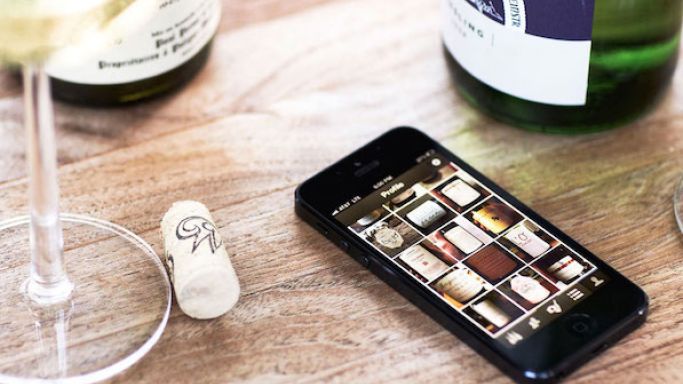22 December We are republishing this today so non-members can keep up with latest developments in wine apps.
19 December I spend my nights writing about (and drinking) wine. I spend my days designing websites and apps and working on digital strategy for big brands around the world. The combination of these two things means that both out of habit and professional interest, I’ve paid close attention to the world of wine apps, and tried almost every one I could get my hands on.
Most are complete and utter crap. [See Richard’s Best wine label scanning apps 2016 – JR]
With the exception of a few utility apps such as Wine-Searcher and CellarTracker, the world of wine apps has largely come down to a battle between two: Vivino and Delectable, both of which essentially offer wine lovers functionality to capture, identify, track and share what they’re drinking with others. For more than two years, these two apps have been acquiring customers, rolling out new features, and courting investment from big names in Silicon Valley.
In a surprise announcement last week, Delectable let customers know that it had been purchased by American wine critic Antonio Galloni (once a major wine reviewer for Robert Parker) and his company Vinous. To the extent that the world of wine apps really consists of these two contenders, the sale of Delectable represented something of a tectonic shift.
Does this mean that Delectable lost the wine app wars, and that Vivino has won?
‘I think Vivino has won the battle for now', says wine writer Simon Woolf. ‘Mainly because it’s solidly marketed at a mainstream audience, hence it has 21 million users, versus a tiny fraction of that in Delectable’s case.’ [See Who uses label-scanning apps most? – JR]
While it is relatively clear that the numbers Vivino shares about its user base are merely the number of people who have downloaded their app (rather than being regular users of the platform), the difference in user populations may indeed be close to an order of magnitude.
Despite that disparity in user base, Delectable’s new owner suggests there’s nothing to concede, yet. ‘I’m not sure I’d agree with the characterisation at all', he says. ‘At the very least we can’t have that discussion for another five years. I don’t think Delectable has lost at all.’
Interestingly, Heini Zachariassen, the founder and CEO of Vivino, doesn’t go that far either. ‘Somehow we went in different directions. It looks like the numbers show they [Delectable] didn’t get pickup from the masses. With 21 million users, we are the biggest wine community ever created. They serve an audience of oenophiles.’
‘I can’t say that Delectable has won', continues Galloni, ‘but the business models are different. Vivino makes money selling wine. Delectable won’t.’
The wine sales component of the Delectable app has been great fodder for speculation and criticism among wine lovers in the days following the sale announcement, with many people pointing to what they see as a brewing conflict of interest.
‘How do people feel about critics also pushing sales?’ wrote Kyle Schlachter in a post on the Wine Beserkers forum only hours after the announcement of the company’s sale. It’s easy to see why that’s a question on many people’s minds, as the app makes it possible for regular users who have stored their credit-card information and address to purchase wines they see in the app with a single click. And in the past year Delectable’s main focus has been on a companion app called Banquet, which allows users to shop for wine in their local wine stores and, in some cases, have that wine delivered within two hours.
On the face of it, Delectable and Banquet seem to be in the business of profiting from wine sales, and few things in the wine world stir up as much controversy as a wine critic who might stand to gain financially directly from the ratings he or she gives to wines.
Despite appearances, however, Delectable is not a retailer, and does not make its money from individual wine sales, nor will it ever attempt to sell individual wines, claims Galloni, who says that he regularly gets wine offers by email from Vivino.
‘I assume their business model is commission-based', says Galloni. ‘Banquet doesn’t send out offers, and we don’t make commissions on sales. Retailers pay a flat monthly fee to sell wines through the platform, and 100% of the dollars go to the retailer. We’re completely agnostic. We don’t care where you buy the wine. The same services are available to anyone, and we’re super-transparent.’
‘The second question anyone ever asks me, after they ask what kind of wine I recommend', adds Galloni, ‘is where they can buy it. It’s a service people need.’
Having been a Delectable user [see disclosure below – JR] since its inception, I can say that there was, indeed, a time when Delectable sent out wine offers to its customers featuring individual wines. It’s been a long time since I’ve received such an offer, but the company has clearly experimented with a number of revenue-generation opportunities over its lifetime, some of which were likely commission-based.
Of course, what matters when it comes to conflicts of interest are not necessarily the facts, but appearances, and these, more than anything, are what Galloni and his team now must grapple with. As I write this, the Delectable app still offers a group of wines for sale called ‘The Inside Track: Stellar Bottles Winery Direct!’ about which it says, '... we are over the moon to be able to feature spectacular bottles available for purchase straight from the winemakers themselves'.
Even if Delectable doesn’t make a cent from such listings, this kind of curated showcase highlighting specific producers specifically to drive sales of their wines would seem likely fodder for outrage by those who believe critics shouldn’t be involved in wine sales.
Some wine lovers have reacted to the purchase of Delectable with dismay, wondering if their favourite app will end up changed beyond recognition, but most regular users, myself included, clearly noticed the atrophy of Delectable over the past year or so. New features and updates weren’t being released, and the community of users did not seem as active as in years past.
‘Initially I liked Delectable better, but they seem to have fallen behind', says Doug Sayed, a wine lover living in Washington state who still uses both apps, but now prefers Vivino.
The great challenge for the majority of technology start-ups comes down to retaining momentum – ensuring that new-user acquisition continues to rise while ramping up revenue or receiving new rounds of investment.
Delectable struggled with most of these factors. User growth was slow, hampered in part by the great length of time the company took to release a version of their app on the Android platform. The company’s focus on serious wine lovers also proved to be a double-edged sword. On the one hand, it meant a sizeable group of tastemakers were available to follow and observe in their drinking habits, and this group generated high-quality content on the platform. On the other hand, this focus, as many have pointed out, may have come at the expense of broader adoption.
‘They are going to have to build a more compelling reason for people like me (in the trade) to “need” or even want this app', writes Alfonso Cevola, wine writer and Italian wine director at Southern Glazer’s, America’s largest wine distributor. ‘I got onto Delectable early on, but perceived it as a platform to post wine selfies without any deeper content. I would have liked to know more about how the wine tasted and why it moved the person to post it (especially the influencers and power users) other than just a picture of another unicorn wine.’
Without steeply climbing user growth, Delectable had a hard time generating revenue, and presumably the company’s venture-capital backers were reluctant to pitch in more money. This, in part, likely prompted the company to develop the Banquet app, which was a much more clearly revenue-generating proposition.
But even Banquet failed to produce the necessary revenues to keep the company afloat, and so after laying off a number of staff, it went shopping for a buyer a few months ago.
‘They had different options [for buyers]', says Galloni, ‘but we had the best complementary strengths. It’s not good enough to just have social media, or just have content, or just have wine-searching capabilities. Our bet is that the combined entity is the winning strategy.’
With that in mind Galloni maintains he has no plans to change the mission or the fundamental business model of either app. Both apps will remain free for consumers, and will begin to incorporate Vinous content over time.
‘We’ll likely have a Delectable premium channel', suggests Galloni, ‘where you can not only have the community rating, and the influencer rating, but also the critics’ rating.’ He goes on to suggest that over time, those ratings might not just be limited to the Vinous platform, but could include other critics and publications as well.
In my opinion, convincing the public that offering purchase options for wines isn’t a conflict of interest won’t prove insurmountable for Galloni. Neither will integrating Vinous content onto the platform, a step that will make the app more valuable to users. The real challenge will be getting people other than existing Vinous users (who already have an app to access Vinous content) to care enough to use the app.
As sommelier Rob Renteria puts it succinctly, ‘I've always thought of Delectable as Instagram/Facebook for wine peeps. That being said, I find looking at pictures of wine that people are drinking, boring.’
Image courtesy of Delectable. By way of full disclosure, I have been on Delectable’s advisory board for the past three years.

